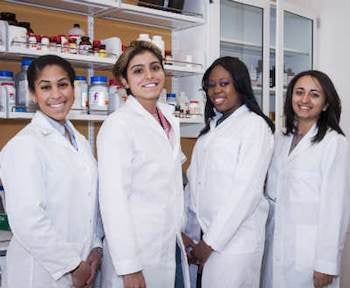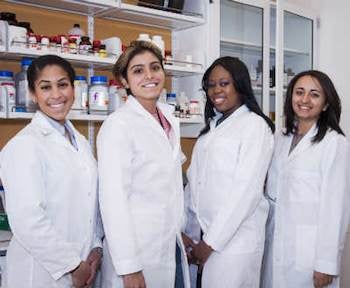 KINGSTON, R.I. – June 9, 2014 – Their hometowns are as diverse as the universities from which they earned their bachelor’s degrees. But they are all now enrolled at the University of Rhode Island for one reason–its Interdisciplinary Program in Neuroscience.
KINGSTON, R.I. – June 9, 2014 – Their hometowns are as diverse as the universities from which they earned their bachelor’s degrees. But they are all now enrolled at the University of Rhode Island for one reason–its Interdisciplinary Program in Neuroscience.
While the four women have different research interests, they agree that the design of the program is what drew them to URI.
They are part of the growing program at URI, which was launched in 2011 and which offers master of science and doctor of philosophy degrees in neuroscience with the goal of educating scientists and professors who can contribute to private and public sector research.
The University has 32 professors/researchers conducting neuroscience research in fields ranging from biomedical engineering to physical therapy and nursing to communicative disorders. Students are exposed to a variety of disciplines during their graduate work.
And just five months ago, the University’s efforts in the field gained a dramatic boost when Thomas M. Ryan, former chief of CVS Caremark and a 1975 URI College of Pharmacy graduate, and Cathy Ryan made a $15 million donation to URI to establish a neuroscience research institute named in honor of Tom’s parents. Called the George & Anne Ryan Institute for Neuroscience at the University of Rhode Island, one of its areas of emphasis is Alzheimer’s, a disease that robbed George Ryan of his vitality and which took a heavy toll on the Ryan family.
Aseel Eid of Coventry, who earned her bachelor’s degree in physiology and neurobiology at the University of Connecticut, is pursuing a neuroscience doctorate in large part because her mother has multiple sclerosis.
Eid said her quest to learn about multiple sclerosis started when she was in high school biology classes and used her knowledge to help her mother understand the disease.
“Many people do not understand these diseases and what can happen to them,” Eid said.
“I love the URI neuroscience program because it requires its graduates to solve real problems, and much of that is done through trial and error. I am here in the lab a great deal,” Eid said. “Another major reason why I enrolled in the program was because its interdisciplinary nature helps remind you why you are here, to do work that directly benefits patients.”
Octavia Miller of Baltimore, who earned a bachelor’s degree in biology with a psychology minor at that city’s Morgan State University, is interested in communicative disorders. She hopes to finish her master’s degree in neuroscience in May, and then begin work on her doctorate at URI.
“I met Alycia Mosley Austin (adjunct assistant professor of biological sciences and executive coordinator of URI’s Interdisciplinary Neurosciences Program) at a conference and she got me very interested in the program,” Miller said. “The interdisciplinary approach is what enticed me to come to URI.”
She is completing her thesis now on treating spastic dysarthria with intensive speech therapy and implementing principals of motor learning. Spastic dysarthria is a speech disorder caused by damage to the central nervous system.
Miller said while her clinical focus differs from her graduate colleagues, they all benefit from having some classes together.
“It allows us to study different aspects of the interdisciplinary program,” Miller said. “When I begin my doctorate, it will be very lab-based, so this phase of my study is making me very well-rounded in neuroscience overall.”
Miriam Dash, a Providence resident who earned her undergraduate degree in biology with minors in chemistry and psychology at St. John’s University, is interested in the environmental factors relating to Alzheimer’s disease and drugs to fight the disease. She is seeking her master’s degree and is researching the roles of amyloid beta and tau, proteins that play key roles in the development of Alzheimer’s. She has been working with Joanna Chang, a URI researcher who is studying a drug that could eliminate harmful tau.
Priscilla Villa, a Central Falls resident and graduate of that city’s high school, has a bachelor’s degree in psychology with a minor in biology from Salve Regina University. Once she passes her qualifying exam, she will enroll in a doctoral program at URI. One of her research experiences included working with James Agostinucci, associate professor of physical therapy and Villa’s major professor, on neuromuscular therapy.
“We would connect subjects to electrodes, stimulate muscles with exercise and see if the therapy made a difference,” Villa said. “The neuroscience part of this is making sure we have the right nerve matched to the right muscle. We also view the action potential and electrical impulses from the stimulation.”
Villa said the pair just click.
“We have absolutely the same personality so we work well together. Plus, I am his first neuroscience student, and by working with me, he hopes to become more involved with the program as well.”
BRAINY GRADUATE STUDENTS: Four graduate students in URI’s Interdisciplinary Neuroscience Program take time out from their studies to pose for a photo. From left are Miriam Dash of Providence, Priscilla Villa of Central Falls, Octavia Miller of Baltimore and Aseel Eid of Coventry. URI photo by Michael Salerno photography.

